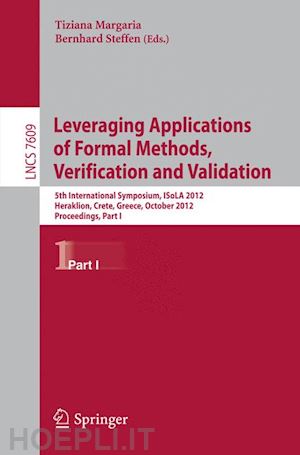
Questo prodotto usufruisce delle SPEDIZIONI GRATIS
selezionando l'opzione Corriere Veloce in fase di ordine.
Pagabile anche con Carta della cultura giovani e del merito, 18App Bonus Cultura e Carta del Docente
Adaptable and Evolving Software for Eternal Systems (Track Summary).- Challenges in Defining a Programming Language for Provably Correct Dynamic Analyses.- Eternal Embedded Software: Towards Innovation Experiment Systems.- A Liskov Principle for Delta-Oriented Programming.- Scientific Workflows: Eternal Components, Changing Interfaces, Varying Compositions.- An Object Group-Based Component Model.- Automated Inference of Models for Black Box Systems Based on Interface Descriptions.- Model-Based Compatibility Checking of System Modifications.- A Generic Platform for Model-Based Regression Testing.- Approaches for Mastering Change.- A Formal Approach to Software Product Families.- A Compositional Framework to Derive Product Line Behavioural Descriptions.- Delta-Oriented Monitor Specification.- Conflict Detection in Delta-Oriented Programming.- Family-Based Analysis of Type Safety for Delta-Oriented Software ProductLines.- A Vision for Behavioural Model-Driven Validation of Software Product Lines.- Parameterized Preorder Relations for Model-Based Testing of Software Product Lines.- SmartTies – Management of Safety-Critical Developments.- Tracking Behavioral Constraints during Object-Oriented Software Evolution.- Towards the Verification of Adaptable Processes.- Runtime Verification: The Application Perspective.- What Does AI Have to Do with RV? (Extended Abstract).- A Case for “Piggyback” Runtime Monitoring.- A Unified Approach for Static and Runtime Verification: Framework and Applications.- Statistical Model Checking QoS Properties of Systems with SBIP.- Monitoring Temporal Information Flow.- Dynamic Information-Flow Analysis for Multi-threaded Applications.- Bounded-Interference Sequentialization for Testing Concurrent Programs.- Runtime Verification of Biological Systems.- Behavioral Specification Based Runtime Monitorsfor OSGi Services.- Modelling and Decentralised Runtime Control of Self-stabilising Power Micro Grids.- Model-Based Testing and Model Inference.- Algorithmic Improvements on Regular Inference of Software Models and Perspectives for Security Testing.- Test-Case Design by Feature Trees.- Model-Based Static Code Analysis for MATLAB Models.- An Incremental Learning Algorithm for Extended Mealy Automata.- Learning Techniques for Software Verification and Validation.- Learning Stochastic Timed Automata from Sample Executions.- Learning Minimal Deterministic Automata from Inexperienced Teachers.- Model Learning and Test Generation for Event-B Decomposition.- Inferring Semantic Interfaces of Data Structures.- Learning-Based Test Programming for Programmers.- LearnLib Tutorial: From Finite Automata to Register Interface Programs.- Automated Learning Setups in Automata Learning.- The RERS Grey-Box Challenge 2012: Analysis ofEvent-Condition-Action Systems.
Challenges in Defining a Programming Language for Provably Correct Dynamic Analyses.- Eternal Embedded Software: Towards Innovation Experiment Systems.- A Liskov Principle for Delta-Oriented Programming.- Scientific Workflows: Eternal Components, Changing Interfaces, Varying Compositions.- An Object Group-Based Component Model.- Automated Inference of Models for Black Box Systems Based on Interface Descriptions.- Model-Based Compatibility Checking of System Modifications.- A Generic Platform for Model-Based Regression Testing.- Approaches for Mastering Change.- A Formal Approach to Software Product Families.- A Compositional Framework to Derive Product Line Behavioural Descriptions.- Delta-Oriented Monitor Specification.- Conflict Detection in Delta-Oriented Programming.- Family-Based Analysis of Type Safety for Delta-Oriented Software Product Lines.- A Vision forBehavioural Model-Driven Validation of Software Product Lines.- Parameterized Preorder Relations for Model-Based Testing of Software Product Lines.- SmartTies – Management of Safety-Critical Developments.- Tracking Behavioral Constraints during Object-Oriented Software Evolution.- Towards the Verification of Adaptable Processes.- Runtime Verification: The Application Perspective.- What Does AI Have to Do with RV? (Extended Abstract).- A Case for “Piggyback” Runtime Monitoring.- A Unified Approach for Static and Runtime Verification: Framework and Applications.- Statistical Model Checking QoS Properties of Systems with SBIP.- Monitoring Temporal Information Flow.- Dynamic Information-Flow Analysis for Multi-threaded Applications.- Bounded-Interference Sequentialization for Testing Concurrent Programs.- Runtime Verification of Biological Systems.- Behavioral Specification Based Runtime Monitors for OSGi Services.- Modelling and Decentralised Runtime Control of Self-stabilising Power Micro Grids.- Model-Based Testing and Model Inference.- Algorithmic Improvements on Regular Inference of Software Models and Perspectives for Security Testing.- Test-Case Design by Feature Trees.- Model-Based Static Code Analysis for MATLAB Models.- An Incremental Learning Algorithm for Extended Mealy Automata.- Learning Techniques for Software Verification and Validation.- Learning Stochastic Timed Automata from Sample Executions.- Learning Minimal Deterministic Automata from Inexperienced Teachers.- Model Learning and Test Generation for Event-B Decomposition.- Inferring Semantic Interfaces of Data Structures.- Learning-Based Test Programming for Programmers.- LearnLib Tutorial: From Finite Automata to Register Interface Programs.- Automated Learning Setups in Automata Learning.- The RERS Grey-Box Challenge 2012: Analysis of Event-Condition-Action Systems.










Il sito utilizza cookie ed altri strumenti di tracciamento che raccolgono informazioni dal dispositivo dell’utente. Oltre ai cookie tecnici ed analitici aggregati, strettamente necessari per il funzionamento di questo sito web, previo consenso dell’utente possono essere installati cookie di profilazione e marketing e cookie dei social media. Cliccando su “Accetto tutti i cookie” saranno attivate tutte le categorie di cookie. Per accettare solo deterninate categorie di cookie, cliccare invece su “Impostazioni cookie”. Chiudendo il banner o continuando a navigare saranno installati solo cookie tecnici. Per maggiori dettagli, consultare la Cookie Policy.